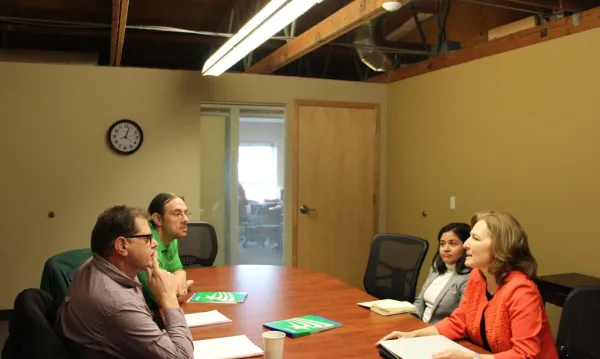Reviving Unionism: Congressperson Kim Schrier on U.S. Policy

WFSE President Mike Yestramski and Congressperson Kim Schrier met this week in Seattle to discuss the swelling wage gap, Americans’ inability to afford soaring drug costs and the workplace violence bill.
“As a former emergency room social worker, this means a lot to me,” said WFSE President Mike Yestramski of H.R. 1309, a bill meant to address workplace violence with new standards and mandated preventative procedures. It passed the House November 21.
Yestramski, a social worker at Western State Hospital (W.S.H ) in Lakewood, Wa., is a vocal advocate on workplace violence. He and other employees of W.S.H. face regular injury from assaults—seeing a coworker leave in an ambulance is a regular occurrence, he said.
“The fact that this is moving forward and getting some attention is incredibly important,” Yestramski said.
Representative Schrier also discussed H.R. 3, the Lower Drug Costs Now Act. The bill would require the federal government to negotiate lower consumer costs with drug corporations, bringing drug prices closer to those of other countries.
Schrier spoke of the protections the bill would grant consumers, and asked what the impact of costly medicine has been for WFSE members.

Even those with job-based health plans are increasingly unable to afford steep copays.
Congressperson Schrier asked Yestramski how the wage gap and current policy are affecting members.
“Buying power has gone significantly down. The strength of the economy is not hitting people on the ground,” he said. “People are working longer hours just to survive.”
Yestramski and Schrier found a shared commitment to the wellbeing of Washington’s working families, and an understanding of the role unions like AFSCME have to play.
Representative Schrier cited studies indicating that declining union density has been linked to growing income inequality.
“What we really need to do if we want to bring back the middle class is support unions,” she said. “That’s how you close the wage gap.”
“We need to make union density a policy priority in this country,” Representative Schrier concluded. “We need to increase power for workers.”
“It’s so much more than negotiating a good contract,” said Yestramski.
“Where I’m from, in Maryland, unions were part of the community,” he said. “The Longshoremen sponsored my tee ball team.”
“It wasn’t just about negotiating wages. God forbid your house burned down, all the unions in the town would pass the hat and show up with groceries. Rebuilding us as a community where we care about our neighbors is incredibly important.”
No workforce in the state of Washington has more at stake in decisions made by the legislature than state employees. If you’ve been affected by rising prescription costs, wage stagnation, workplace violence, or government shutdown, it’s important that your representatives hear your voice. Click here to join other members in speaking up.
